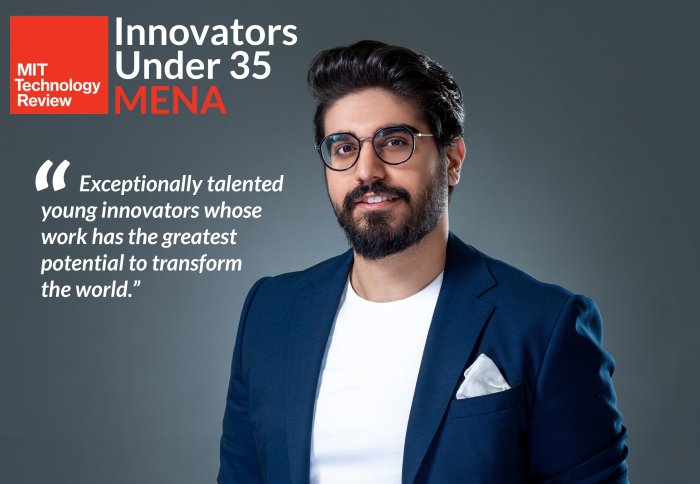Imperial researcher invents self-cleaning lens for keyhole surgery

Dr Ahmad Nabeel's device can clean the lens used in keyhole surgery without removing it from the patient, saving time and increasing patient safety.
For his innovation, Dr Ahmad Nabeel, postgraduate student and honorary researcher in Imperial’s Institute of Global Health Innovation (IGHI), has been named as an MIT Tech Review Innovator Under 35 (Middle East and North Africa).
Automated cleaning
Ahmad’s innovation KLENS is a surgical optics enhancement technology that automates the cleaning process of the camera used in keyhole surgery, known as a laparoscope.
During surgery, the lens of a laparoscope can become obscured by fluids in the body. Currently the device must be removed from the body and manually cleaned – a process which has not changed since laparoscopy was invented over a century ago.
Ahmad says that his device could clean the camera in 0.4 to 0.8 seconds, according to lab tests in a simulated environment, a significant improvement on the up to 2 minutes it currently takes.
The small, lightweight, disposable device can be retrofitted onto existing laparoscopes as an add-on, which is more cost-effective than creating a new one from scratch with the device built in.
Driving in a storm with no wipers
Ahmad’s inspiration came during doing a rotation in surgery after graduating from medical school. He noticed that when a patient was bleeding during a laparoscopic procedure, the consultant surgeon had to retract the laparoscope and manually clean the lens. Ahmad likens this to driving a car in stormy weather with no windscreen wipers and having to get out of the car to manually clean the windscreen every few minutes.
Crucial technology
A sheath with inner tubes and chambers would automatically deliver carefully calculated bursts of fluid along the shaft of the scope directly onto the lens to clean it. Any residual droplets would then be automatically removed off the surface of the lens. At the same time, the temperature of the liquid would be tightly controlled throughout these miniature tubes to ensure optimal clarity regardless of what is blocking the camera lens – fog, fat, debris, or blood.
Ahmad had to ensure that the device would not significantly increase the diameter of the laparoscope’s shaft, which would ultimately require the surgeon to make a bigger incision. The most crucial part of the technology (the shaft with the chambers, channels, and nozzles) is being built within a surface area of approximately 1mm squared.

Innovation impact
Ahmad says that the innovation could potentially benefit more than 15 million patients yearly. Time that can be saved in the operating theatre can also save money, meaning his innovation has the potential to impact the global cost of healthcare. By automatically cleaning the lens every time it becomes obstructed, the surgeon’s visual field would be enhanced, leading to better performance and less disruption in the flow of the operation or procedure, thus increased patient safety. The device would also be key for robotic surgery, where there may often be no staff present to clean the camera lens.
“I literally jumped out of my seat when I got the email!”
Speaking about winning the award, Ahmad said: “I didn’t think I could win! The level of competition was really high. I literally jumped out of my seat when I got the email! It’s one of the most prestigious awards in innovation worldwide.
“To be among these names and on the MIT Tech Review website gives huge recognition to the quality of the work we’re doing and the importance of the problem we’re tackling.
“I have received tremendous support from Hutan and Lord Darzi, which I highly appreciate.”
Global innovators
The Middle East and North Africa (MENA) edition includes innovators from all over the world who come from MENA origins, or foreigners who are living in MENA countries. The award will be given in a special ceremony under the patronage of HH Crown Prince of Dubai, Sheikh Hamdan bin Mohammed bin Rashid Al-Maktoum.
By winning the MENA edition, Ahmad is automatically pre-qualified as a candidate for the global list which will feature the top 35 innovators in the world under the age of 35, announced in late 2020.

Originally from Kuwait, Ahmad is now based in London, working alongside the IGHI’s Co-Director Professor the Lord Ara Darzi and Hutan Ashrafian, Clinical Lecturer in Surgery, who nominated Ahmad for the award and is supervising the project.
Ahmad has also worked with HRH Professor Salman Al-Sabah, the Advisor to the Health Minister in Kuwait and the President of the Kuwait Association of Surgeons on this project.
Article text (excluding photos or graphics) © Imperial College London.
Photos and graphics subject to third party copyright used with permission or © Imperial College London.
Reporter
Joanna Wilson
Communications Division